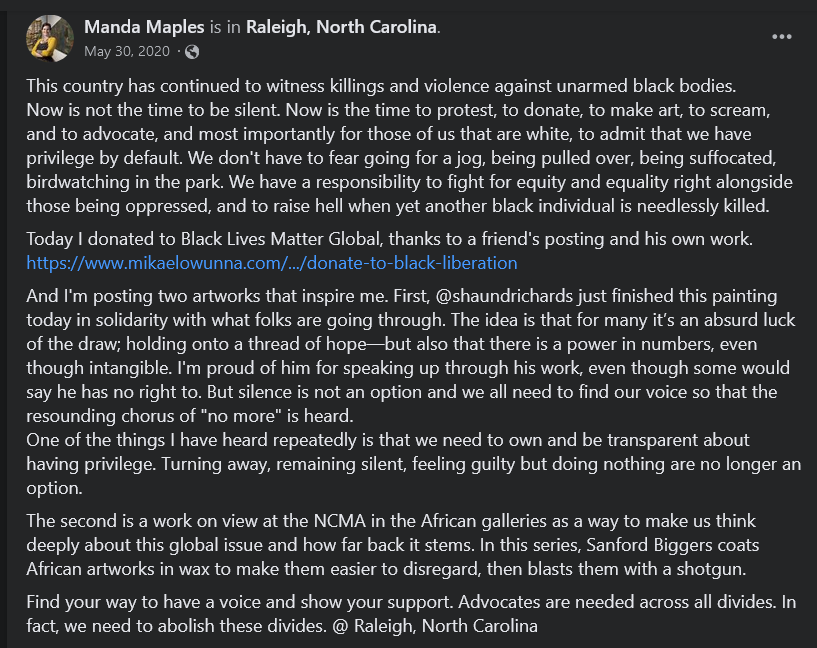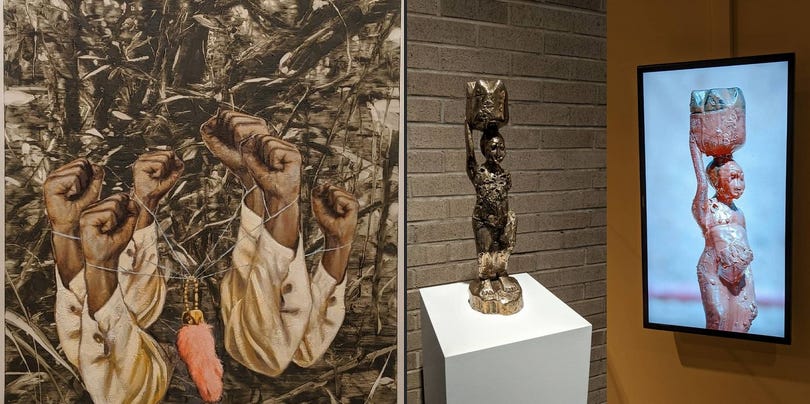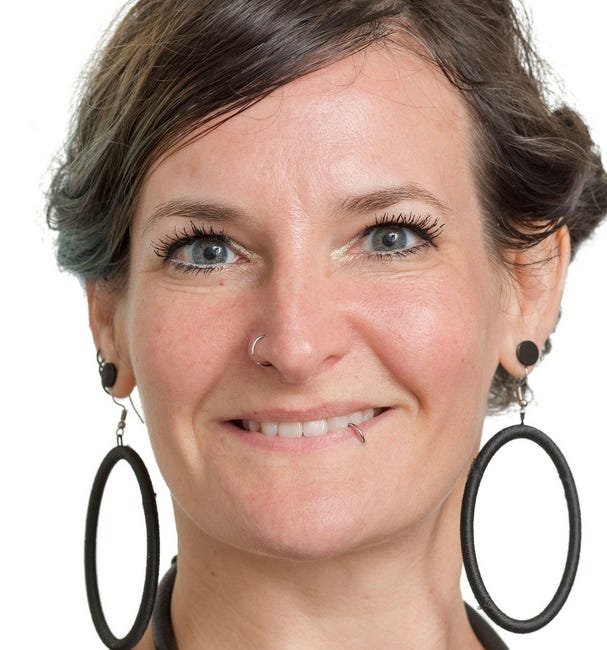Art Critic Doug MacCash Writes About The Museum's "Controversial" Hire
It is not enough to be white and "allied" with black people; it is never enough
There is no such thing as “enough” for Leftist racists.
You cannot ally yourself with “the struggle” enough to satisfy Leftists. If you’re white, no amount of blood-letting for the cause is enough. It is never satisfactory. You have never demonstrated your adjacency with satisfactory verve.
You can never be ‘enough.’
The new hire at the New Orleans Museum of Art posted this during the summer of Covid lockdowns George Floyd:
Now is the time “to scream.” And you white people here in New Orleans have nothing to fear going out for a jog… you’re white!!!
The woman seems properly aligned with black Leftism and other Far Left politics, no?
She’s “doing the work” is she not?
Or am I reading this wrongly and she’s the First Secretary to the Raleigh, North Carolina Chapter of the Ku Klux Klan?
Art critic to the Times Picayune Doug MacCash wrote (a day after we did) about the museum controversy.
Last week, the New Orleans Museum of Art trumpeted the hiring of a new curator to oversee the 112-year-old institution’s trove of traditional art from various African cultures.
North Carolina native Amanda Maples' credentials are impressive. She earned a doctorate in visual studies from the University of California after studying visual anthropology at the University of Kent in Canterbury, England, and anthropology at the University of North Carolina.
Before accepting the job at NOMA, Maples was the curator of global African arts at the North Carolina Museum of Art. Her highest-profile curatorial accomplishment so far is an exhibit she composed titled “Good as Gold: Fashioning Senegalese Women,” which appeared at the Smithsonian’s National Museum of African Art in 2018.
On paper, Maples seemed suited for the job. But criticism quickly arose, because NOMA had selected a White person to manage the collection of art and artifacts that is a touchstone of African culture. At this writing, more than 4,500 comments have accumulated beneath the announcement of Maples’ hiring on NOMA’s Facebook page, most questioning the NOMA administration’s judgment.
As one commenter put it: "With all due respect to her qualifications, isn't it also incredibly important to empower someone to curate their own history? Isn't it incredibly important to increase diversity in your staff, and isn't this an obvious position for that?”
In response, NOMA quickly released a statement to the press, promising to “listen closely” to the concerns of New Orleans residents, but also acknowledging “that listening is only a small part of honoring our commitment to being an inclusive and anti-racist institution."
The process
In a telephone conversation Thursday, NOMA’s director of marketing and communications, Charlie Tatum, explained that the museum relied on an outside consultant to reach candidates. In the end, he said, Maples was selected based on a set of criteria that was applied to all applicants.
The museum, he said, sought someone with expertise in African art history and experience with the repatriation and restitution of artifacts that may have been illegitimately collected in the past.
Tatum said the museum expected the new curator to increase the museum’s collection to include contemporary examples of African arts and crafts, to expand the geography of NOMA’s collection to all areas of the continent, and to have connections with colleagues and institutions in Africa.
“People of African descent were definitely considered,” Tatum said, but in the end, Maples won out.
Calls for greater representation
Tatum wouldn’t say if the museum anticipated the public criticism of the decision to hire a White curator for the role of African art authority. But he noted that there had been precedent for the situation. In 2018, the Brooklyn Museum experienced a similar public outcry when it appointed a White woman as a consulting curator of African art.
At the time, he said, “important voices in the field of African Art did stand up for her.”
Tatum said the Brooklyn Museum controversy was “indicative of larger issues in the field,” and resulted in “calls for greater representation, more African-American voices in academia and the museum world.”
A recent post on The Art Newspaper website concerning the NOMA controversy cites a 2018 episode of NPR’s “Code Switch” podcast, in which Steven Nelson, then director of the UCLA African Studies Center, said that “the field of African art history in the U.S. is largely white and female.”
Advancements compromised?
Contacted by phone, Professor Haitham Eid, director of the Master of Arts in Museum Studies Program at Southern University at New Orleans, said he doesn’t doubt that NOMA’s new curator is qualified. But not choosing someone of African descent was a profound misjudgment, he said.
In his view, NOMA has made strides in recent years toward racial inclusiveness, but this incident, he said, is “a huge mistake that compromised all the advancements the museum has made.”
According to Eid, Black curators are available. For example, he said that between nine and 11 students graduate from SUNO’s Museum Studies program each year. Most are African-American.
“Appointing a white curator for NOMA’s African art collection raises questions about the authenticity and lived experiences that should inform the interpretation and curation of these artworks,” Eid wrote in a passionate social media post. “African art is deeply rooted in cultural practices, traditions, and histories that can only be fully understood by those who have a personal connection to these communities.”
Past controversy
In recent years, NOMA has staged several exhibits that honor Black culture, including “Black Orpheus: Jacob Lawrence and the Mbari Club,” “Picture Man: Portraits by Polo Silk,” “Called to the Camera: Black American Studio Photographers” and “The Quilts of Gee’s Bend.”
But in 2020, five former Black employees accused the museum of racial insensitivity and slighting Black people in employment opportunities.
In a public letter, NOMA’s former public programs manager, Jennifer Williams, said Black employees felt underrepresented and isolated in the museum workplace.
“You walk into a board room full of 20 to 30 people, the management staff and decision makers,” she said, “and there’s one Black man and one Black woman present.”
In the aftermath, the museum, a public institution that serves a majority Black population, promised to be more conscious of its future policies and procedures.
“We pledge that the power of our actions will define what we aspire to as a community,” NOMA director Susan Taylor said after the 2020 incident.
Tatum said that since 2022, 43 percent of NOMA’s new hires have been non-White.
Immersing in New Orleans
Maples replaces Ndubuisi Ezeluomba as African art curator. Ezeluomba, who was raised in Benin City, Nigeria, left NOMA in 2022 to take a position at the Virginia Museum of Fine Arts. William Fagaly, who joined the museum’s staff in 1966, is credited with establishing NOMA’s extensive African art collection. Fagaly retired in 2016 and died in 2021.
Reached by phone, Maples said she had no comment on the situation.
In a prepared statement, Maples said: “As I continue to immerse myself in New Orleans, I am considering how to fill historical gaps in the museum’s extensive collection to tell the fullest story of African art possible and how NOMA can highlight the work of contemporary artists in Africa.”
She is currently curating a future exhibit titled "New Masks Now: Artists Innovating Masquerade in Contemporary West Africa," which may be especially interesting to New Orleans audiences, since masking is such an important feature of our contemporary culture. The show is scheduled to open at NOMA in 2025.
Tatum said that in view of the negative public reaction, the museum plans to conduct a town hall-style meeting to discuss the issue of race and equity within museums. No date for the event has been set.
Questions:
A black chef from New Orleans East would like to study French cuisine and work in a French restaurant. Is he allowed to work there? He’s not French.
An expert in Irish castles visits Germany to study German castles. Can he write an academic paper on his studies? He’s not German.
An ambitious black woman from the Ninth Ward attended Southern University of New Orleans and graduated last year with a 3.1 GPA in Museum Studies. Her credentials exceed the credentials of this white woman curator, so the local person should be hired because the museum happens to be in her hometown?
Racism lives on the Left, in the hearts of Democrats, in the souls of black and white people who see skin color as primary in understanding others.
We at The BEC truly loathe these racist monsters.





